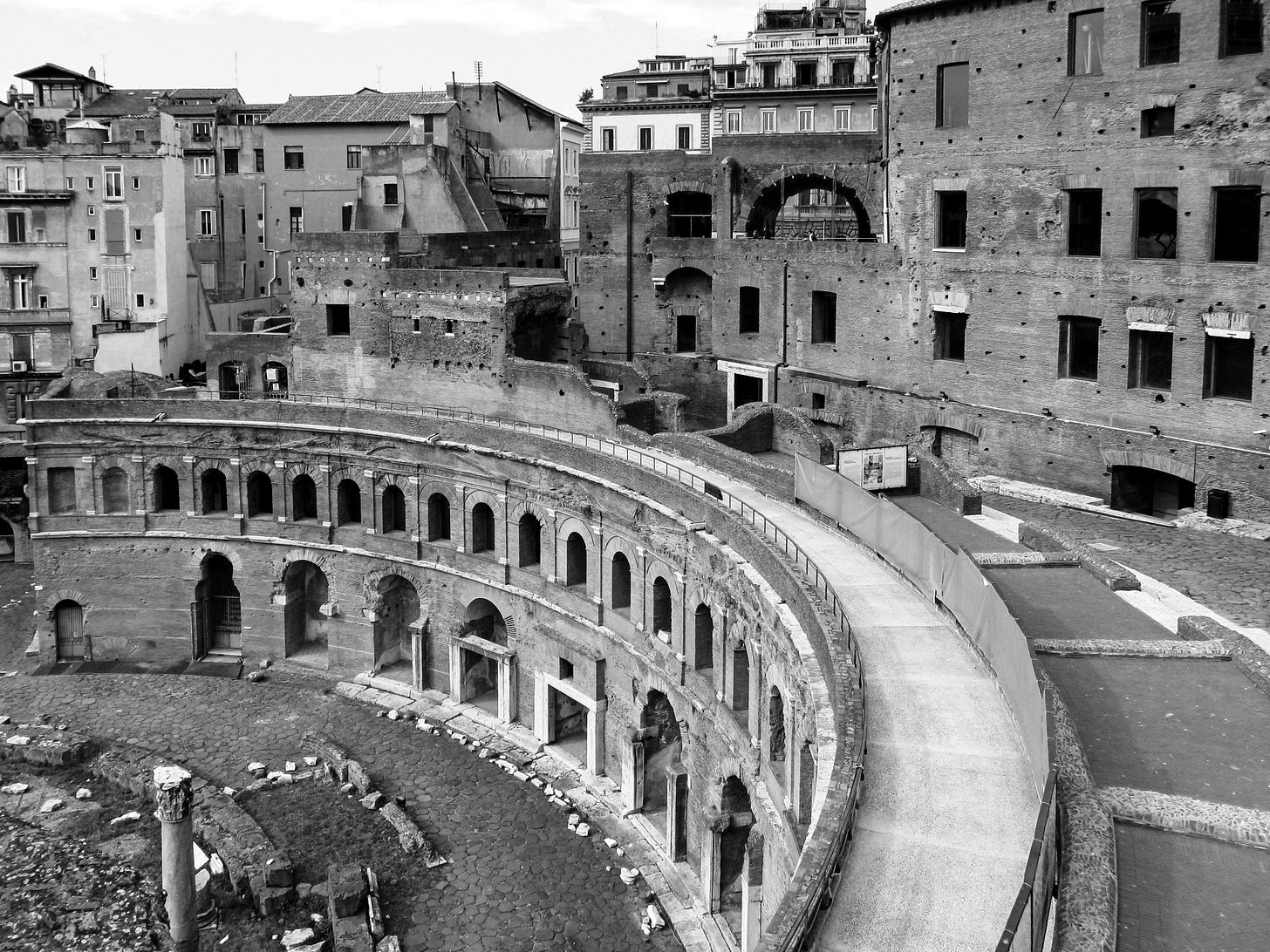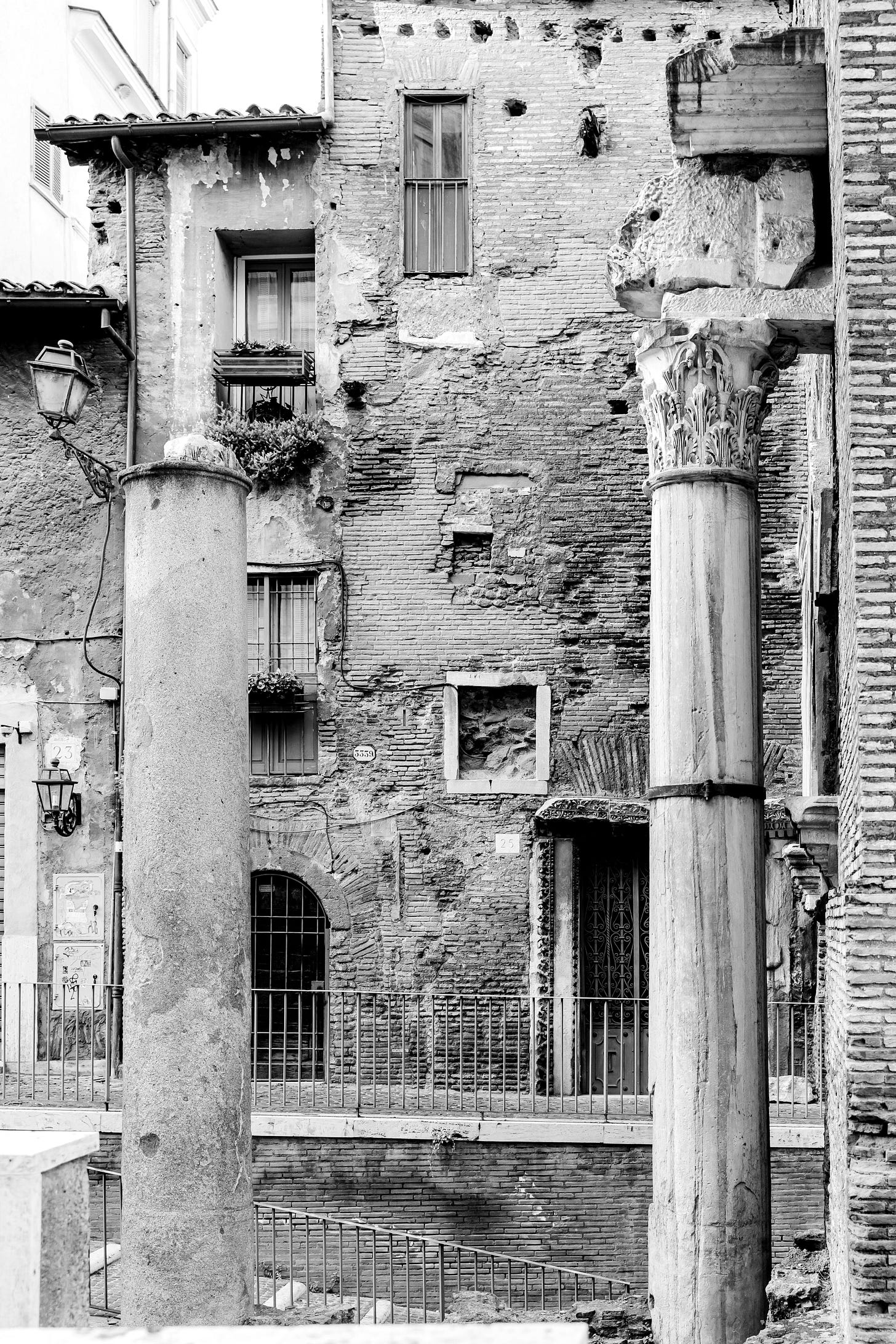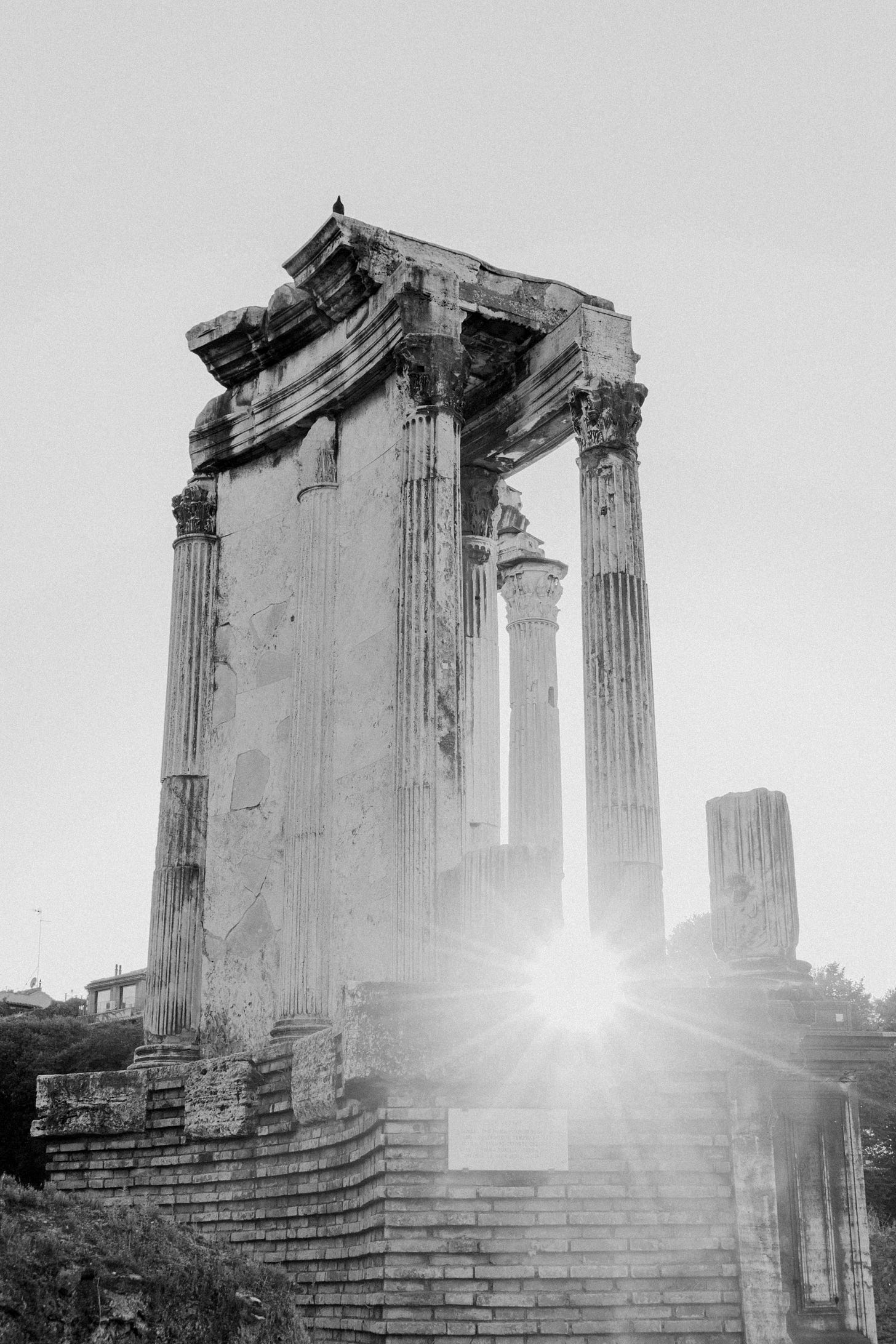Palimpsest (Noun): A manuscript that has been erased, written over, and reused multiple times, yet still bears traces of its past.
Rome doesn't try to hide where it's been. The city carries its scars with a triumphant nonchalance, its violent history chiseled into eroded walls and compressed into cobbled streets. Everywhere, the past and present intertwine. The Colosseum, half-bared and scarred, doesn't ask for pity—it simply stands. The Forum, fragmented and sprawling, offers no resolution—only echoes. Symphonies paused mid-note. Nothing here is finished. But nothing is erased either.
The Eternal City was endlessly plundered, built upon, defiled, and revered. It was torched by Gaulish fury, ravaged by Visigoth vengeance, and stripped by Vandal greed. Its heart was shattered by Caesar's assassination, and its body scorched by Nero's negligence. Time and again, Rome fell—crumbling, fractured, left for dead. Yet it never erased its destruction. It built with it. The ruins weren't swept away; they became part of what came next.

Over the holidays, I didn't travel to Rome for business or pleasure. This was a full-scale evacuation. With her gentle insistence, my wife Bailey saw what I couldn't. "You need to go," she told me. "And you need to go alone." I resisted at first, convincing myself I was OK. OK, as I concluded the most triumphant year of my career, with multiple standing ovations and bookings spilling into the following year. OK, as I ricocheted from city to city, sometimes keynoting five times a week, feeling more physically capable than ever. OK, as I poured my heart into building my latest startup.
But beneath the veneer of productivity, there was a growing fracture I could no longer ignore. This wasn't burnout—I knew the signs well: reduced efficacy, exhaustion, cynicism. None of those applied. What I was carrying felt heavier, older, and harder to name. High-functioning depression, perhaps. Or mixed anxiety-depressive disorder. Maybe complex post-traumatic stress disorder. Or simply grief that I hadn't allowed myself to feel.
Through back-to-back pregnancy losses, I kept moving, working, creating, and holding it together. But fault lines deepen fractures. And fractures widen into shatters. By December, I was all but broken.
I didn't choose Rome. I fled to it. A jarring, shapeless, unplanned inversion of everything I had made my life. Rome didn't demand anything from me. It offered no itinerary, no feedback, no expectations. No Ubers. No Slack pings. No dress rehearsals. No client calls, no back-to-back meetings, no presentations to review. No expectation to smile, deliver, or prove I was OK. My brisk days were blank pages in a worn palimpsest, waiting to be written over.

I wandered the jagged streets without a destination, letting the city unfold however it wanted. It felt strange, almost wrong, to have nowhere to be. My life had been a symphony of schedules. To stop, to exist—was unsettling. No one was waiting for me, no deadline was pulling at me, and no priority was weighing on my mind. For the first time in years, I was quiet. Not just in speech, but in spirit. I stopped checking my phone, I stopped opening my laptop. I stopped planning my next move.
I stopped trying to pretend I was OK.
It's hard to describe what silence feels like when you haven't known it for years. Not the polite quiet of a boardroom or the uneasy stillness of an empty hotel room at the end of a conference, but a silence that felt...full. It wasn't the absence of sound; it was the absence of expectation. I didn't need to answer questions, didn't need to explain myself, and didn't need to fill the air with words. So I walked. I walked for hours without speaking, without checking directions, without refreshing any timelines. There were no texts to send, no emails to draft, no briefs to review. There was just the sound of my footsteps on cobblestone, the discordant hum of the city, and the rustle of leaves in courtyards older than memory.

As the nebulous days blended into one another, the loud silence softened. I walked without purpose, letting the city's stories reveal themselves. A broken marble column leaned into the dusk, its coarse surface kissed by the day’s lingering sunlight. Ivy tangled over limestone that had survived centuries of storms. Haggard windows glinted in the late afternoon, their light fluttering like whispers. Rome didn't care about my plans—or lack thereof. It simply was. Ancient, chaotic, indifferent.
There's no single moment I can point to, no grand revelation. But Rome spoke to me sagaciously—not in words, but in shadows. It didn't tell me anything at all. It simply showed me what it looked like to hold everything—loss and life, past and present, ruin and resilience—all at once, without breaking. It showed me what it looked like to be OK.

Toward the end of the trip, I sat in a bustling trattoria, stumbling through a conversation in broken Italian with my waiter. My phrasing was clumsy, my grammar worse, and I had nearly exhausted my limited vocabulary. "Mi dispiace," I admitted, apologizing for not speaking more fluently. “Posso parlale in Inglese?” (“Can we switch to English?”) He chuckled and earnestly replied, "No, no, no…Sei Italiano!" ("No…You’re Italian!”) I sat there amused—not because it was true; I'm not—but because for a fleeting moment, I believed I was. Rome felt like home. Not because I had immersed myself in the language or the culture, but because I was blissfully maskless. For the first time in a long time, I wasn’t performing or proving anything. I had simply shown up as I was—imperfect, unpolished, ruins and all.

Grief doesn't have tidy edges. It doesn't fade neatly into the background or vanish when you're busy. It lingers, pressing itself into the corners of your days, folding into your subconscious, waiting to be acknowledged. Like ruins, it becomes part of you. The pain of two miscarriages will always be with me—buried in coarse soil, carved in cracked stone. A kind of crude architecture, an askew structure of what I’ve endured. In The Eternal City, I let it breathe. I let it find its place in me. Grief isn't something I can leave behind, but it's something I can carry differently now.
As I walked through The Forum on my last evening, the sun setting behind crumbled arches, I admired how the city doesn't try to hide where it's been. The ruins aren't symbols of failure; they're chapters in a neverending story. The fractures don't need fixing, and the weight doesn't need shedding. It can simply be carried. The ruins mark not an end, but a beginning. When you stop erasing and start integrating, fragments don’t need to be reassembled—they simply remain. And that’s perfectly OK.




